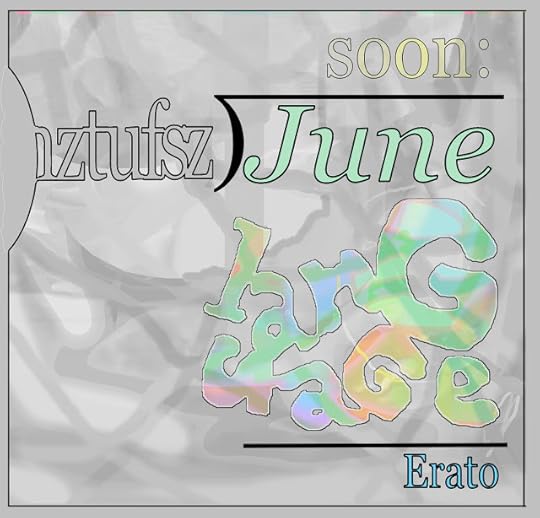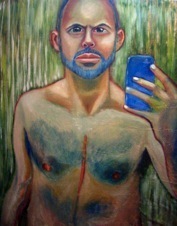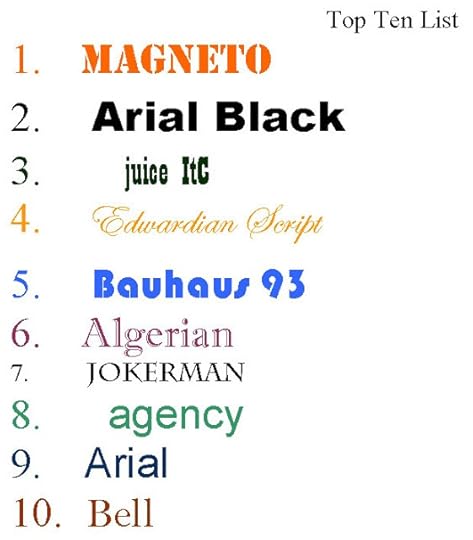Geof Huth's Blog, page 38
February 5, 2011
February 4, 2011
A Poetics (65 Only)
65. Silence
Poetry is not about silences, but silences occur within it: spaces between words, between breaths, between lines and stanzas. But poetry, which is the process of speaking and saying and showing and being in place as a palpable fact, is burdened by silence, the silence of what would be ignoration if English had as single word for the process of being ignored, what the Turkish novelist Ahmet Hamdi Tanpınar called the conspiracy of silence until he went himself into his final silence, since which time his work has been read much more, at a time that assured he would have no personal benefit from the recognition. But the poet doesn't matter anyway; only the poem does.
ecr. l'inf.
Poetry is not about silences, but silences occur within it: spaces between words, between breaths, between lines and stanzas. But poetry, which is the process of speaking and saying and showing and being in place as a palpable fact, is burdened by silence, the silence of what would be ignoration if English had as single word for the process of being ignored, what the Turkish novelist Ahmet Hamdi Tanpınar called the conspiracy of silence until he went himself into his final silence, since which time his work has been read much more, at a time that assured he would have no personal benefit from the recognition. But the poet doesn't matter anyway; only the poem does.
ecr. l'inf.
Published on February 04, 2011 20:00
February 2, 2011
Happy Birthday, You Old Groundhog
 Bob Grumman, "Mathemaku in Praise of Language"
Bob Grumman, "Mathemaku in Praise of Language"Yes, today is a day of traditions. Groundhog Day. James Joyce's birthday. And the one day each year that I must turn my gaze Grummanward, to my oldest* friend, Bob Grumman, who turned 70 today. And I will try to change this tradition a little bit. By not focusing on jokes at his expense. (I didn't say there wouldn't be any, only that I wouldn't focus on that one thing.)
Bob is a man in search of the truth, which means he is constantly being driven crazy by those of us who believe the truth, is well, a bit impertinent sometimes and sometimes clearly a fraud, those of us who believe that the world isn't gin or tonic but gin and tonic, that things are mixed up and that that makes for the interesting intellectual collisions of life.
As a taxonomist, Bob is interested in many things, once spending years on a taxonomy of mailboxes (quadrupeds, nonpeds, etc.). But his real focus is knowledge. Bob is a thinker above all else. Above feeling, above eating, above sleeping, above cleaning his house. (I can vouch for the accuracy of all of these points I'm making.) But he is a passionate man as well. He cares what a poem is, and even I, who give to the poem a grand and polysemous set of senses, am bound by honor to honor that. Bob lives for the poem, whatever that little thing of worded sense actually is. Bob just spends more time than the rest of us pruning away the fluttering edges of the meaning of the poem so that we have only the poem itself, and pure, to deal with.
Bob is also an arguer, and one who loves arguing, which I do not. At some point near the beginning of an argument about poetry, I tend not to care, because no-one has to believe what I believe. Because I'm not a searcher for truth. I'm a searcher and maker of "truth." Two different things, so it's good, for my sake, that I'm not an arguer.
But I cannot forget one thing: Bob is a poet (while also being a writer of other kinds). And he is a visual poet, and his visual poetry is always unemotional, unhazy, directly meaningful. I mean, he knows what his poems me (which, to me, is a great surprise; if I were expected to know what my poems were about, I'd be in big trouble). Bob's intellectual and controlling bent might make people think his poetry wouldn't work, but those are those who do not know Bob's work. The best of Bob's visual poetry is among the best work being done in the field now. He's one of the few visual poets nowadays whom I think has produced masterpieces, not many, but plenty. The rest of us, well, we might produce good work, even masterful work, but most of us are not in the realm of those few pieces.
And as any poet knows (meaning as any person who will be remembered for the rest of time for nothing more than three memorable poems), a few great pieces is the breadth and depth of a life.
So merry birthday, Mr Crumbbug, and turn down the lights and sleep once in a while. People tell me the null zone can be relaxing and should not be denigrated.
_____
* And I mean "old" in the only true sense, the sense that he is ancient, I mean really really old, not in the sense that he's been a friend of mine for a quarter of a century. I mean, come on, a word can have only one true meaning. Otherwise, we'd be too confused to communicate.
ecr. l'inf.
Published on February 02, 2011 20:53
February 1, 2011
The Scar and the Thirteen Stations
 Didi Menéndez, "The Scar" (30-31 January 2011)
Didi Menéndez, "The Scar" (30-31 January 2011)Until last Saturday, when Didi Menéndez painter her first portrait of me, I had never had anyone paint my portrait, but she started a second portrait on Sunday and finished that one on Monday, so I've now had someone paint my portrait twice in one week. The second portrait is much larger than the first, and a bit more dramatic.
When Didi had finished the first portrait, she had sent me a photograph of the portrait and a video of her discussing the painting. I told her how I liked that documentation, so she ended up sending me thirteen short videos as she worked on this larger painting. Over the course of two days, I had the opportunity, from hundreds of mile away from her, to see her create a painting, and it was an interesting experience for non-painter like me.
Didi also explained what she was doing, and sometimes she asked me questions in the videos, all of which made this experience more interesting and valuable to me. It was almost as if I were a live model in the room, though all I'd done was send her three photographs of myself, and she made portraits out of two of them.
I thought she'd choose the photo this painting was based on, because it was a slightly dramatic photo of myself ostensibly, but not actually, completely unclothed, and it was significantly a picture of the scar from my open heart surgery.
What follows is the series of videos Didi had sent me in chronological order from top to bottom, thus allowing you to see how this painting was created. And, way at the bottom of this, a copy of the photograph the painting was based on.
I like what Didi has made of that photograph, the power of the eyes she has painted, and the fact that she's extended the scar a little further than it really goes, just to make the painting a little more dramatic. My thanks to Didi for painting these two portraits, especially since she will be giving them to me as gifts as well.
30 January 2011
31 January 2011
 Geof Huth, "Self-Portait (Clothed, but Pretending Not to Be)" (19 September 2010)
Geof Huth, "Self-Portait (Clothed, but Pretending Not to Be)" (19 September 2010)ecr. l'inf.
Published on February 01, 2011 20:14
January 31, 2011
Daniel's List
 Today, my sister Nini (named after our aunt recently deceased) sent me a little piece of work her son Daniel Renfro created in the computer lab at school. He was proud of the work and wanted it passed on to his parents, because, as one of the teachers said, "He would like to show them his work."
Today, my sister Nini (named after our aunt recently deceased) sent me a little piece of work her son Daniel Renfro created in the computer lab at school. He was proud of the work and wanted it passed on to his parents, because, as one of the teachers said, "He would like to show them his work."Looking at this list, I am amazed by his youthful interest in typography, or at least in the allography variety of letters as demonstrated in various typefaces. And in his interest in color as well, his interest in variety. He's starting out well for a youngster. For goodness' sake, he was just a ring-bearer at my daughter's wedding, so he's young for this.
Maybe he has a bright future ahead of himself as a visual poet, a typographer, of an artist. And he has the advantage of being able to place with typefaces at an early age, something that was exceedingly rare for someone of my age, half a century of age.
ecr. l'inf.
Published on January 31, 2011 20:15
January 30, 2011
A Poetics (61-64)
61. Mushroom
While cutting mushrooms, I considered the fact that mushrooms, which seem to us a distinct form of food (one separate from fruits and meats and maybe even from vegetables, one that is in itself a complete type of naturally occurring food), range in edibility from delicious and edible to tasteless and edible to slightly bad for human consumption in certain instances (such as hens of the woods growing on pines) or to certain people (slightly allergenic) to mildly poisonous and of bad taste to the final and unfortunate state of delicious and deadly poisonous in a quick-acting way. Humans learned these facts not by a process of deduction but of reduction, by testing these fruits of ethereal or determined darkness over the course of generations, some peoples never learning that one type of mushroom they avoided was perfectly edible because their culture had never tested (by means of tasting) that variety.
Mushrooms are not ever really simply mushrooms, however, which are, more precisely, simply those fungi with a stem topped by a cap, but which are sometimes narrowed to mean only those mushrooms that are edible (as distinct from "poisonous mushrooms"), and, in my case here, "mushrooms" is simply a word and concept I'm using, something metaphoric, rather than real, because I am reminded that we had to learn, as the people of the continuing earth, how to define mushrooms, how to segregate them into categories by edibility so as to stave off death from eating, and that tells me that definition in the case of mushrooms, even if the word "mushroom" isn't itself that stabilized in meaning, is essential, which reminds me that the definition of the term "poem" or "poet" is helpful, and maybe essential to some, though not all, discussions of poetry, but that precision of definition is not essential in the sense of ensuring or denying the continuation of human life.
62. Definition
So I would say that a poet is someone who creates poems and that what a poem can be is defined in item number 60n.
63. "Truth"
The lie we most fervently believe. This is particularly true of poets, and two contradictory beliefs, two contradictory lies, can both be examples of "truth.
64. Marked-to-Show-Quotation
Nabokov, who butterflied more ideas together than most of us ever will until we could see no distinction between the absurd and the rapturous, believed that "reality" was a word that must always appear within quotations marks (meaning the word is really "'reality'"). The other such word, the one he forgot to mention, was "'truth.'"
ecr. l'inf.
While cutting mushrooms, I considered the fact that mushrooms, which seem to us a distinct form of food (one separate from fruits and meats and maybe even from vegetables, one that is in itself a complete type of naturally occurring food), range in edibility from delicious and edible to tasteless and edible to slightly bad for human consumption in certain instances (such as hens of the woods growing on pines) or to certain people (slightly allergenic) to mildly poisonous and of bad taste to the final and unfortunate state of delicious and deadly poisonous in a quick-acting way. Humans learned these facts not by a process of deduction but of reduction, by testing these fruits of ethereal or determined darkness over the course of generations, some peoples never learning that one type of mushroom they avoided was perfectly edible because their culture had never tested (by means of tasting) that variety.
Mushrooms are not ever really simply mushrooms, however, which are, more precisely, simply those fungi with a stem topped by a cap, but which are sometimes narrowed to mean only those mushrooms that are edible (as distinct from "poisonous mushrooms"), and, in my case here, "mushrooms" is simply a word and concept I'm using, something metaphoric, rather than real, because I am reminded that we had to learn, as the people of the continuing earth, how to define mushrooms, how to segregate them into categories by edibility so as to stave off death from eating, and that tells me that definition in the case of mushrooms, even if the word "mushroom" isn't itself that stabilized in meaning, is essential, which reminds me that the definition of the term "poem" or "poet" is helpful, and maybe essential to some, though not all, discussions of poetry, but that precision of definition is not essential in the sense of ensuring or denying the continuation of human life.
62. Definition
So I would say that a poet is someone who creates poems and that what a poem can be is defined in item number 60n.
63. "Truth"
The lie we most fervently believe. This is particularly true of poets, and two contradictory beliefs, two contradictory lies, can both be examples of "truth.
64. Marked-to-Show-Quotation
Nabokov, who butterflied more ideas together than most of us ever will until we could see no distinction between the absurd and the rapturous, believed that "reality" was a word that must always appear within quotations marks (meaning the word is really "'reality'"). The other such word, the one he forgot to mention, was "'truth.'"
ecr. l'inf.
Published on January 30, 2011 19:56



